October 21 is:
Apple Day
Babbling Day
International Day of the Nacho
Count Your Buttons Day
National Pumpkin Cheesecake Day
Per Foodimentary.com
Pennsylvania Dutch-style cheesecake uses a slightly tangy type of cheese with larger curds and less water content, called pot or farmer’s cheese.
Philadelphia-style cheesecake is lighter in texture, yet richer in flavor than New York style cheesecake.
Farmer’s cheese cheesecake is the contemporary implementation for the traditional use of baking to preserve fresh cheese and is often baked in a cake form along with fresh fruit like a tart.
Country-style cheesecake uses buttermilk to produce a firm texture while decreasing the pH (increasing acidity) to extend shelf life.
Lactose free cheesecake may be made either with lactose-free cream cheese or as an imitation using Vegan recipes combining non-dairy cream cheese alternatives with other lactose-free ingredients.
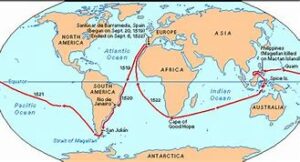 1520 – Ferdinand Magellan discovered a strait now known as Strait of Magellan, a channel linking the Atlantic and Pacific Oceans, between the mainland tip of South America and Tierra del Fuego island.
1520 – Ferdinand Magellan discovered a strait now known as Strait of Magellan, a channel linking the Atlantic and Pacific Oceans, between the mainland tip of South America and Tierra del Fuego island.
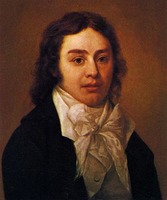 Birthday of Samuel Taylor Coleridge (October 21, 1771), English poet, critic, and philosopher. Author of “The Rime of the Ancient Mariner” and “Kubla Knan”
Birthday of Samuel Taylor Coleridge (October 21, 1771), English poet, critic, and philosopher. Author of “The Rime of the Ancient Mariner” and “Kubla Knan”
Day after day, day after day,
We stuck, nor breath nor motion;
As idle as a painted ship
Upon a painted ocean.Water, water, every where,
And all the boards did shrink;
Water, water, every where,
Nor any drop to drink.
First display of the word “Liberty” on a flag, raised by colonists in Taunton, Massachusetts in 1774 and which was in defiance of British rule in Colonial America.
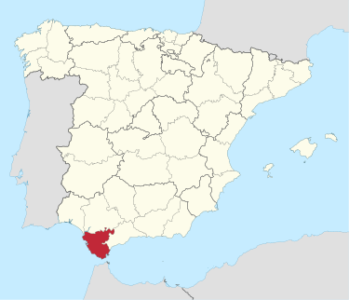 October 21, 1805 – The Battle of Trafalgar The Royal Navy, commanded by Admiral Horatio Nelson, decisively defeated Napoleon’s combined Spanish and French fleet; the battle took place off the cape. Lord Nelson sent the famous flag signal, “England expects that every man will do his duty”.
October 21, 1805 – The Battle of Trafalgar The Royal Navy, commanded by Admiral Horatio Nelson, decisively defeated Napoleon’s combined Spanish and French fleet; the battle took place off the cape. Lord Nelson sent the famous flag signal, “England expects that every man will do his duty”.
He was killed in battle. Trafalgar is in the southwest corner of Spain.
From Wikipedia:
Twenty-seven British ships led by Admiral Lord Nelson aboard HMS Victory defeated thirty-three French and Spanish ships under French Admiral Villeneuve. The battle took place in the Atlantic Ocean off the southwest coast of Spain, just west of Cape Trafalgar, near the town of Los Caños de Meca. The Franco-Spanish fleet lost twenty-two ships and the British lost none.
The victory confirmed the naval supremacy Britain had established during the course of the eighteenth century and it was achieved in part through Nelson’s departure from the prevailing naval tactical orthodoxy of the day. Conventional practice at the time was for opposing fleets to engage each other in single parallel lines, in order to facilitate signalling and disengagement, and to maximize fields of fire and target areas. Nelson instead arranged his ships into two columns to sail perpendicularly into the enemy fleet’s line.
During the battle, Nelson was shot by a French musketeer and he died shortly before the battle ended. Villeneuve was captured, along with his ship Bucentaure. He later attended Nelson’s funeral while a captive on parole in Britain. Admiral Federico Gravina, the senior Spanish flag officer, escaped with the remnant of the fleet. He died five months later from wounds sustained during the battle.
Birthday of Alfred Bernhard Nobel (October 21, 1833), Swedish chemist and engineer who invented dynamite and other explosives.
 Birthday of Benjamin Netanyahu (October 21, 1949), Israeli Prime Minister.
Birthday of Benjamin Netanyahu (October 21, 1949), Israeli Prime Minister.
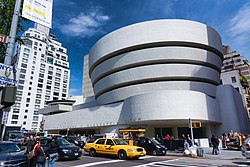 1959: The Guggenheim Museum, designed by Frank Lloyd Wright, opened in New York City.
1959: The Guggenheim Museum, designed by Frank Lloyd Wright, opened in New York City.
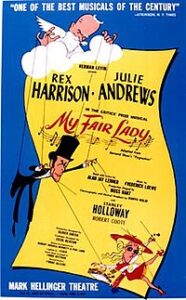 1964: The American musical film My Fair Lady, starring Rex Harrison and Audrey Hepburn, had its world premiere, and it later won eight Academy Awards, including that for best picture. My Fair Lady is a musical based on George Bernard Shaw’s 1913 play Pygmalion, with a book and lyrics by Alan Jay Lerner and music by Frederick Loewe. The story concerns Eliza Doolittle, a Cockney flower girl who takes speech lessons from professor Henry Higgins, a phonetician, so that she may pass as a lady. Despite his cynical nature and difficulty understanding women, Higgins falls in love with her.
1964: The American musical film My Fair Lady, starring Rex Harrison and Audrey Hepburn, had its world premiere, and it later won eight Academy Awards, including that for best picture. My Fair Lady is a musical based on George Bernard Shaw’s 1913 play Pygmalion, with a book and lyrics by Alan Jay Lerner and music by Frederick Loewe. The story concerns Eliza Doolittle, a Cockney flower girl who takes speech lessons from professor Henry Higgins, a phonetician, so that she may pass as a lady. Despite his cynical nature and difficulty understanding women, Higgins falls in love with her.
The meter was defined at the seventeenth (1983) General Conference on Weights and Measures as the distance light travels in a vacuum in 1/299,792,458 of a second.
